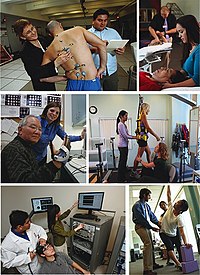
Photo from wikipedia
Abstract Objective To determine the effectiveness of community-based rehabilitation interventions which incorporate outdoor mobility on physical activity, endurance, outdoor mobility and falls-related self-efficacy in older adults. Design MEDLINE, Embase, CINAHL,… Click to show full abstract
Abstract Objective To determine the effectiveness of community-based rehabilitation interventions which incorporate outdoor mobility on physical activity, endurance, outdoor mobility and falls-related self-efficacy in older adults. Design MEDLINE, Embase, CINAHL, PEDro and OpenGrey were searched systematically from inception to June 2021 for randomised controlled trials (RCTs) of community-based rehabilitation incorporating outdoor mobility on physical activity, endurance, outdoor mobility and/or falls-related self-efficacy in older adults. Duplicate screening, selection, extraction and appraisal were completed. Results were reported descriptively and with random-effects meta-analyses stratified by population (proactive [community-dwelling], reactive [illness/injury]). Results A total of 29 RCTs with 7,076 participants were identified (66% high bias for at least one domain). The outdoor mobility component was predominantly a walking programme with behaviour change. Rehabilitation for reactive populations increased physical activity (seven RCTs, 587 participants. Hedge’s g 1.32, 95% CI: 0.31, 2.32), endurance (four RCTs, 392 participants. Hedges g 0.24; 95% CI: 0.04, 0.44) and outdoor mobility (two RCTs with 663 participants. Go out as much as wanted, likelihood of a journey) at intervention end versus usual care. Where reported, effects were preserved at follow-up. One RCT indicated a benefit of rehabilitation for proactive populations on moderate-to-vigorous activity and outdoor mobility. No effect was noted for falls-related self-efficacy, or other outcomes following rehabilitation for proactive populations. Conclusion Reactive rehabilitation for older adults may include walking programmes with behaviour change techniques. Future research should address the potential benefit of a walking programme for proactive populations and address mobility-related anxiety as a barrier to outdoor mobility for both proactive and reactive populations.
Journal Title: Age and Ageing
Year Published: 2022
Link to full text (if available)
Share on Social Media: Sign Up to like & get
recommendations!